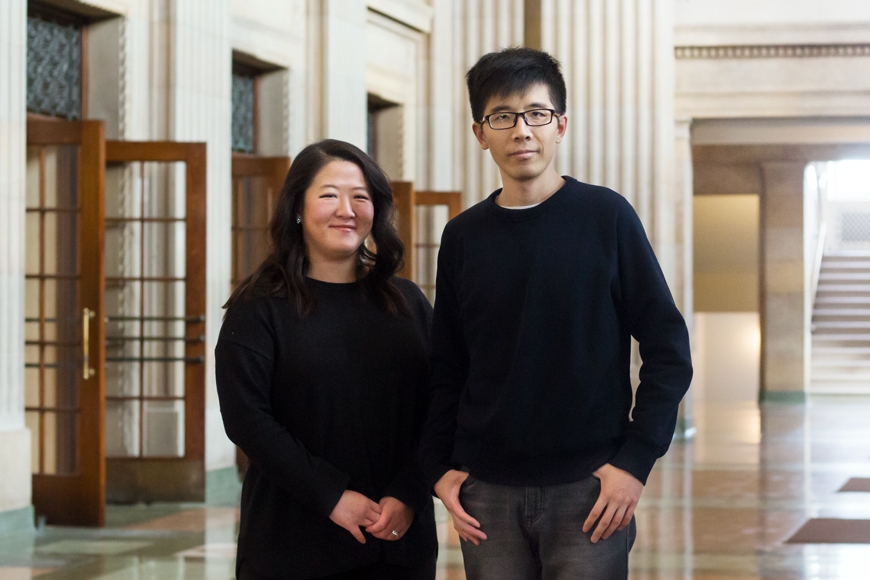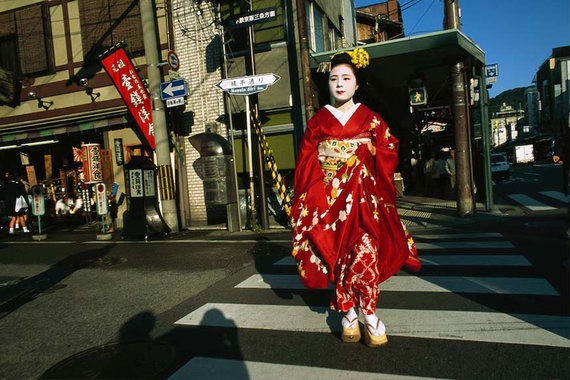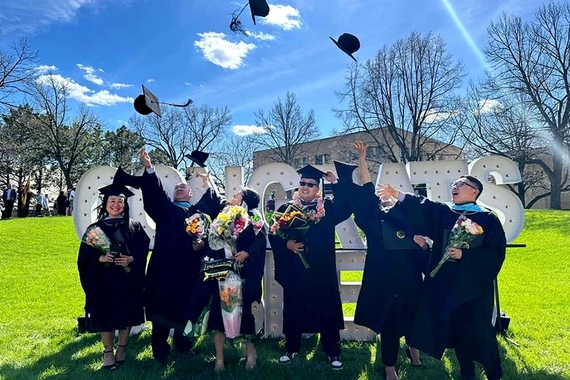Laughing and Learning: Studying Asian Comedy Film
For some, comedy film is more than just something to watch with friends on a Friday night.
Soo Hyun Lee and Hui Liu are graduate students studying Asian comedy cinema through the Department of Asian Languages and Literatures’ (ALL) PhD program in Asian Literatures, Culture, and Media (ALCM).
Lee is from Seoul, South Korea and came to the United States after earning undergraduate and master’s degrees from Korea University. While writing her master’s dissertation on South Korean cinema of the late 1950s, she felt it necessary to expand her knowledge concerning theories and histories of cinema and obtained a second master’s degree in cinema studies from New York University. Her studies focus on Korean comedy cinema.
Liu hails from Hefei, the capital of Anhui Province in China. He earned a master’s degree in film studies from King’s College in London. His studies center on Chinese cinema and popular culture, and he focuses on the genre of Chinese black comedy, which is a comic style that makes light of subjects that are typically considered heavy or disturbing.
They joined us for a conversation on their studies and experiences in the ALL graduate program.
What part of studying your genre of comedy film do you enjoy most?
LEE: My interest in the mechanism of laughter was sparked during my studies at Korea University. While I was writing my master’s thesis, I became curious about how comedy films are narrated in the history of Korean cinema. Even though comedy films gained popularity and formulated certain conventions in the late 1950s and early 1960s, significant scholarship on comedy films of this era was absent.
What I enjoy the most about studying Korean comedy films is that I can reconstruct and imagine the cultural spirit of the time. It’s intellectually rewarding, like solving a mystery or puzzle. Plus, comedy films from the past are surprisingly enjoyable to watch!
LIU: I am fascinated by the cinematic medium, and it is always enjoyable for me to do film textual analysis. I think film representation is elusive and ambivalent, and so it necessitates careful tracing and analysis of shots, scenes, and sequences, which can reveal gaps and ambivalences that are open to contesting interpretations.
As a highly popular and socioculturally grounded genre, Chinese comedy film negotiates well with China’s ideological constraints while provocatively critiquing contemporary Chinese society. It is a challenging project with great potential, though the genre has yet to receive the scholarly attention it deserves.
What are your career goals? What inspired you to pursue them?
LEE: I would like to remain in academia doing research and teaching Korean cinema at the college level. I aspire to contribute, in at least some small way, to the field so that my research can become a part of the lexicon for future generations.
LIU: Like Soo, I hope to join the faculty at a university, remaining active as a scholar and continuing my research on Chinese and international cinemas. It is truly a privilege to be able to commit my time to what interests me.
How have your courses set you up for your future career?
LEE: Until I came to the University of Minnesota, my educational experience was limited to Korean national literature. The 8000-level core courses offered here, particularly ALL 8001 (Critical Approaches to Asian Literary and Cultural Studies), have given me a transnational perspective of Asian Studies and enabled me to think outside the box.
LIU: The courses on Asian and film studies have introduced me to the fundamental approaches to film analysis, literary, and cultural studies. Meanwhile, the courses that I’ve taken on Chinese and international cinemas and media span a wide range of geographical locations and historical periods, opening up possibilities for genealogical investigation and cross-cultural examination. Moreover, all of these courses have enabled me to gain necessary critical thinking skills, analytical skills, and research insights.
What brought you to the University of Minnesota?
LEE: Most importantly, the faculty and staff [in the ALL department] are very supportive, which creates an atmosphere of community. Students are always respected as future scholars. As a graduate student, I am given guaranteed office space, fellowship opportunities, travel grants for conferences, and much more, and that makes me feel more like a community member, not just a student. The department is also very flexible—I’m allowed to take various courses outside of ALL that broaden my theoretical and methodological perspective.
LIU: I strongly desired to be a part of the department’s inclusive and friendly environment that promotes conversations and academic exchanges across areas, historical periods, genres, and media. I feel very lucky to be a part of it.
What is one film that you consider influential to your research that you would recommend to others?
LEE: I’d recommend Han Hyung-Mo’s Hyperbola of Youth (Ch'ŏnch'un Ssanggoksŏn, 1956). It’s my all-time favorite Korean comedy film. It’s unique because it shares many conventions with Korea’s music drama film era. These conventions formed the aesthetics of South Korean comedy films in the 1960s. It interestingly combines the slapstick, rom-com, and musical genres, and I think anyone would find it entertaining.
LIU: I would particularly recommend two films—Jiang Wen’s Let the Bullets Fly (2010) and Ning Hao’s Crazy Stone (2006). The former uses a historical and geographically remote setting as an allegory for the present, and the latter directly addresses the postsocialist everyday life of the petty urbanite. Both of them are highly influential works made when black comedy was widely popular in mainland China.
This story was written by an undergraduate student account executive in CLAgency. Meet the team.



